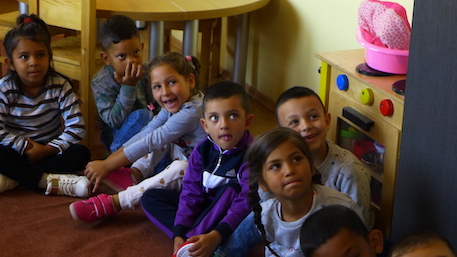Weeskinderen in Roemenië
Na de val van de dictator Nicolae Ceausescu in 1989 kwamen beelden naar het Westen van tienduizende Roemeense weeskinderen, die in vreselijke omstandigheden leefden. Ze zijn het slachtoffer van Ceausescu’s politiek die contraceptie verbood en vrouwen verplichtte minstens vijf kinderen te hebben.
Goedmenende paren uit West-Europa en de VS trokken in grote groepen naar Roemenië en begonnen de kinderen te adopteren. Maar de $20.000 tot $30.000 die ze neertelden voor de adoptie bleek al snel te aanlokkelijk in een land waar het gemiddelde maandloon rond de $100 schommelt. Om aan de vraag te voldoen schoot het aantal kinderen in de weeshuizen prompt de hoogte in. Naar schatting 30.000 kinderen vonden zo een nieuwe thuis in het buitenland.
Na een rapport van het Britse europarlementslid Emma Nicholson voerde de Roemeense regering in 2001 een tijdelijk verbod in op internationale adopties. Toch vertrokken nog honderden kinderen naar een nieuwe buitenlandse familie, vooral in de VS en Italië.
In 2004 maakte de Europese Commissie aan Roemenië duidelijk dat zij een efficiënte kinderbescherming moesten hebben als zij bij de EU wilden komen. EU-deskundigen hielpen een nieuwe wet op te stellen die in 2004 door het parlement werd goedgekeurd. De wet geeft voorrang aan Roemeense paren en maakt internationale adoptie een allerlaatste optie. Buitenlanders kunnen alleen nog een Roemeens kind adopteren als het om hun kleinkind gaat en als een zoektocht naar een Roemeens pleeggezin niets heeft opgeleverd. Ouders die geld of goederen aannemen in ruil voor hun kind, riskeren een celstraf van maximaal zeven jaar.
De situatie in Roemenië is nog steeds vreselijk maar door financiele hulp vanuit het buitenland kan er veel gedaan worden. Stichting Livada zorgt dat deze kinderen de morele en financiele steun krijgen om een fundament te (her)bouwen waardoor zij de grondslag kunnen leggen voor een betere toekomst voor henzelf en hun omgeving.
Ervaringen uit Roemenië (groenten- en fruitkas project 2011)
1. Story of Kristina Jonas
This summer I worked in the garden and did a few things like: planted different vegetables: carrots, parsley, I helped tie the tomatoes on the stakes to support the tomato; i helped pick the vegetables like: tomatoes, green paper, peppers, and chili peppers. It was really nice. I really liked it and I would like next summer to help again because i think it’s a wonderful thing.
Love, Kristina
2. Story of Bela
This summer I had a great time, I was involved in different activities but I took time to help with the garden. I made a commitment about this, so the whole summer I helped with different things.
I picked all the rocks that were not necessary and also pulled the weeds. After that I helped plant the seeds.
I worked with all my heart, and if you love what you do and you have patience, then you can work. Every night I went and watered the garden by myself.
I was so happy to see the plants grow, so my heart was joyful to see my work pays off. I could watch how the plants grow: carrots, parsley, green peppers, chili peppers, and broccoli.
The fall came and I was excited I could pick the fruits, because they all tasted so good. After picking them up, I loved the most to eat the tomatoes.
I could not do this hard work without my tutor: Jeni.
Love, Bela
3. Story of the educator
The group home Rebeca has kids who are skilled in working in the garden. In the garden worked with love Dita Kalanyos, who helped with the carrots and the parsley, and also Levi Darvas.
Kristina Ionas and Eniko Ionas helped also in the garden. They helped taking care of the green pepers, cabbage, tomatoes, broccoli, and cauliflower together with Emese Ionas. They also had a great time tie the tomatoes on the sticks. Bella was the most involved kid from the group home, so every night he went by himself and watered the plants in the garden.
We had plenty of fruits, so we were able to pick in the end tomatoes, green papers, cabbage, and cucumbers. I could see on their faces they were happy working in the garden. Next summer the kids said they want to be more involved and more responsible about helping work in the garden.

